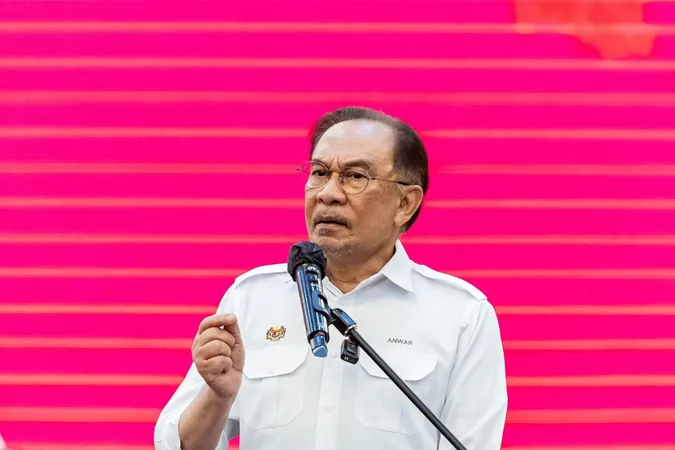
Malaysia's Bold Move: Prime Minister Term Limits on the Horizon!
2025-04-04
Author: Li
Introduction
In a significant political development, Prime Minister Datuk Seri Anwar Ibrahim has thrown his weight behind a groundbreaking proposal aimed at capping the prime minister's tenure in Malaysia to two terms or a maximum of 10 years. This push, first brought to the forefront by DAP secretary-general Anthony Loke during a recent party congress, could redefine the future of governance in Malaysia.
Historical Context
The historical context of this reform is crucial—only two of Malaysia’s ten prime ministers have previously served more than 10 years: Tunku Abdul Rahman (1955-1969) and Tun Dr Mahathir Mohamad, who is noted for his staggering 22 years in office during his first decade (1981-2003). The shadow of these long tenures has often raised concerns about governance stagnation and the need for fresh leadership.
The Resurgence of the Two-Term Limit Proposal
But what spurred this resurgence of the two-term limit proposal? The concept has been a staple of the Pakatan Harapan (PH) coalition’s agenda for several years. Back in December 2019, then-Prime Minister Dr. Mahathir sought to amend the Federal Constitution to implement this reform. Unfortunately, this initiative was halted in August 2020, following a unanimous Cabinet decision under Tan Sri Muhyiddin Yassin’s leadership.
The idea resurfaced in September 2021 when then-Prime Minister Datuk Seri Ismail Sabri Yaakob indicated willingness to support a 10-year limit in a bid for political stability. Although a draft Bill was prepared by February 2022, it never reached Parliament due to its dissolution ahead of the 15th general election.
Current Advocacy and Opposition
Anwar's recent advocacy for this policy has not been universally embraced. The Islamist party PAS has voiced strong opposition, with president Tan Sri Abdul Hadi Awang arguing that such a limitation contradicts divine intentions, claiming that the prime minister's role should not be seen as a "temporary position." Ironically, PAS had previously supported a similar proposal back in 1999 while part of the Barisan Alternatif coalition.
The Constitutional Hurdles
For this initiative to materialize, it necessitates an amendment to Article 43 of the Federal Constitution. This article currently states that the Yang di-Pertuan Agong must select a prime minister from amongst the members of the House of Representatives who commands majority confidence. The suggested amendment would introduce a new condition: the candidate should not have previously held the office of prime minister for two terms.
Legal authorities emphasize that amending the Constitution would require a supermajority—a two-thirds majority—within the Dewan Rakyat, Malaysia's lower house of Parliament. Furthermore, constitutional lawyer Bastian Pius Vendargon highlighted the necessity for the Yang di-Pertuan Agong's consent, as well as a two-thirds majority in both legislative houses. Luckily, this amendment would not require the approval of the Conference of Rulers, since it does not directly affect their rights or privileges.
A Global Perspective on Term Limits
Interestingly, Malaysia is not alone in its considerations for term limits. Worldwide, many democratic nations have adopted similar measures. In the United States, presidents are limited to two four-year terms, a policy established by the 22nd Amendment after Franklin D. Roosevelt served an unprecedented 13 years.
In Southeast Asia, Thailand enforces a maximum of eight years for its prime ministers, reflecting a desire for political renewal. Indonesia follows suit with a limit of two five-year terms for both the president and vice-president, introduced after a lengthy era dominated by just two leaders. The Philippines, meanwhile, restricts its presidency to a single six-year term, a change enacted after the ousting of Ferdinand Marcos, renowned for his 20-year rule.
Conclusion
As discussions unfold around the proposed two-term limit in Malaysia, the outcomes will echo not just locally but resonate within regional and global political contexts. With various responses from political factions and public opinion, the push for reform may herald a new chapter in Malaysia’s political landscape—a step toward fostering accountability and rejuvenated leadership. Will this move propel Malaysia into a new era of governance, or will opposition prevent progress? Stay tuned as the story develops!


 Brasil (PT)
Brasil (PT)
 Canada (EN)
Canada (EN)
 Chile (ES)
Chile (ES)
 Česko (CS)
Česko (CS)
 대한민국 (KO)
대한민국 (KO)
 España (ES)
España (ES)
 France (FR)
France (FR)
 Hong Kong (EN)
Hong Kong (EN)
 Italia (IT)
Italia (IT)
 日本 (JA)
日本 (JA)
 Magyarország (HU)
Magyarország (HU)
 Norge (NO)
Norge (NO)
 Polska (PL)
Polska (PL)
 Schweiz (DE)
Schweiz (DE)
 Singapore (EN)
Singapore (EN)
 Sverige (SV)
Sverige (SV)
 Suomi (FI)
Suomi (FI)
 Türkiye (TR)
Türkiye (TR)
 الإمارات العربية المتحدة (AR)
الإمارات العربية المتحدة (AR)